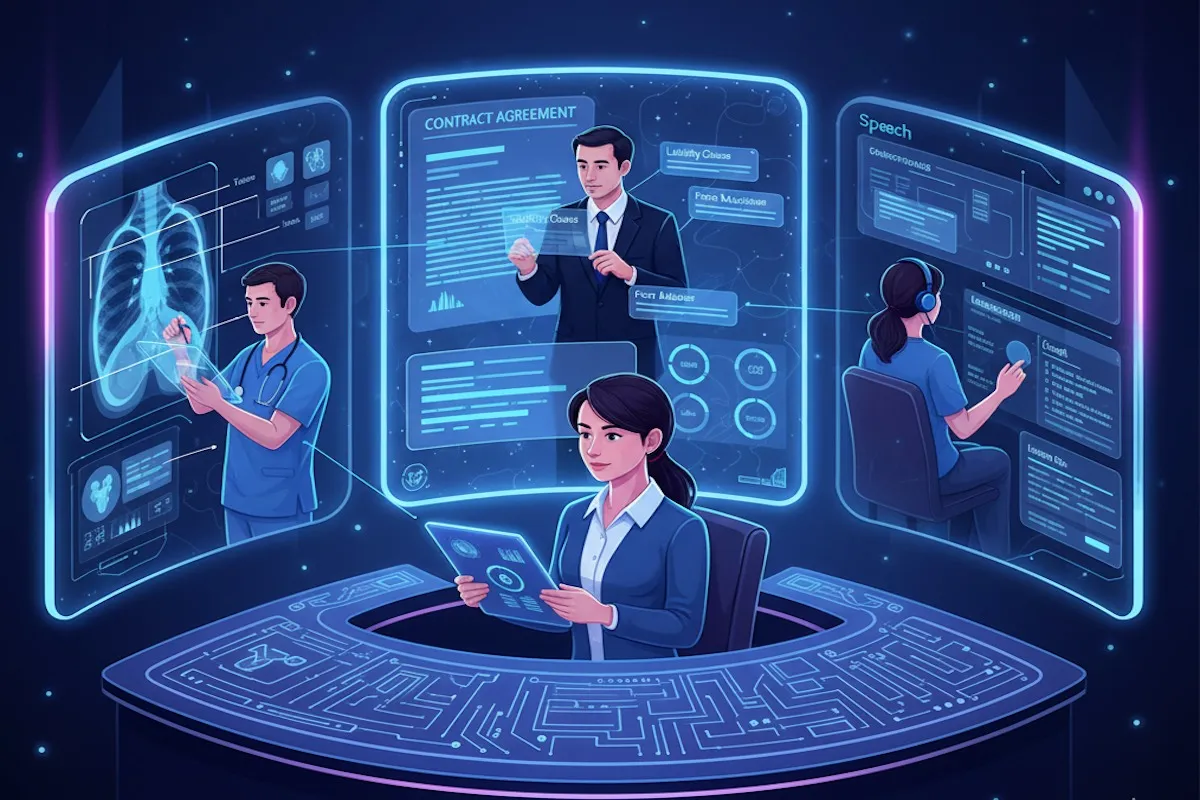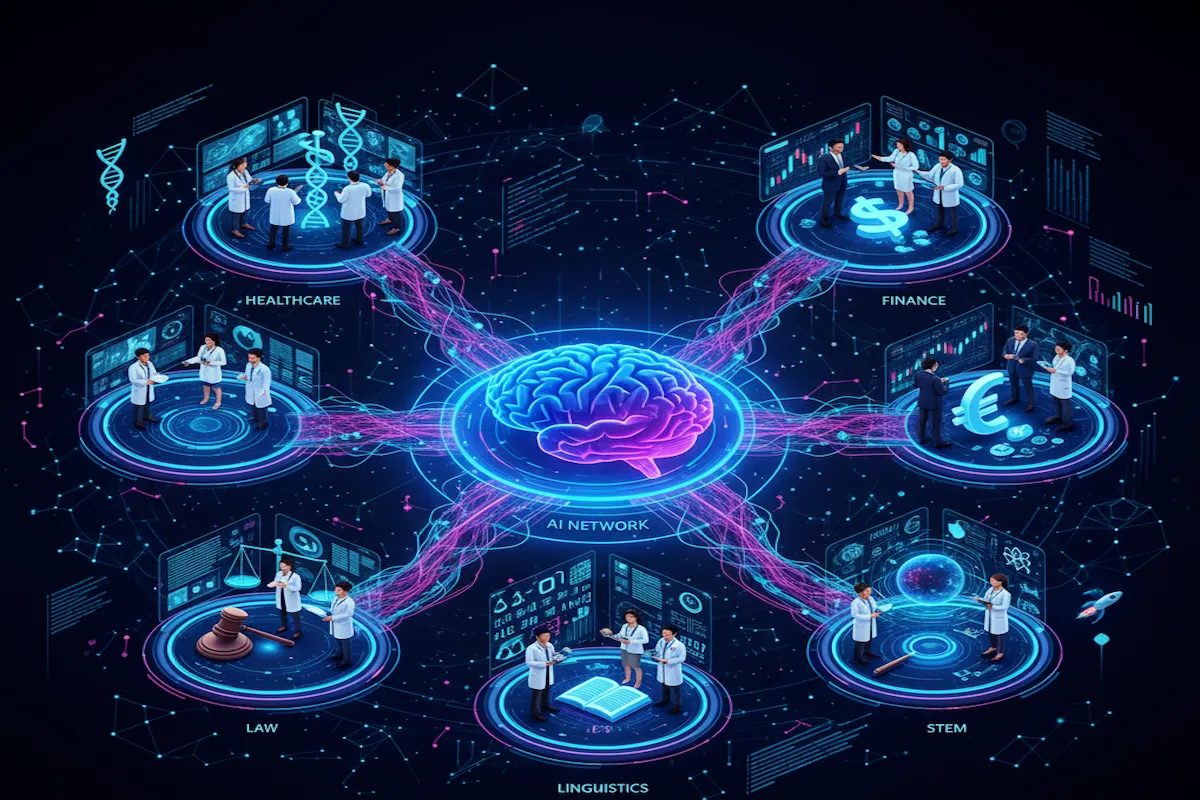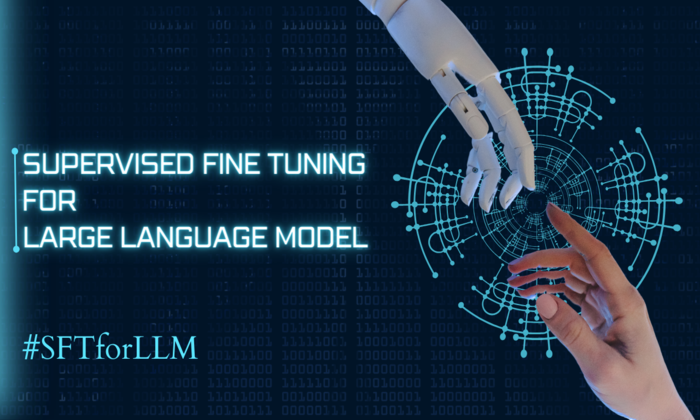We’ve already consumed most of the internet’s data to build powerful AI models that can chat, generate content, and analyze information at scale. But when it comes to domain-specific AI, the gap is still wide. These models often struggle because they lack one crucial ingredient: expert knowledge from the field itself.
That’s where Subject Matter Experts (SMEs) come in. General-purpose AI can predict and suggest, but SMEs bring the accuracy, context, and depth needed to make AI truly useful in specialized areas whether it’s medicine, law, finance, or stem.
If you’re building AI systems, working with SMEs isn’t optional, it’s essential. Here’s a clear look at what our SMEs can do, why they make a difference, and how your organization can gain from partnering with us.
What Exactly Do Our Subject Matter Experts Do?

At FutureBeeAI, we believe that building great AI is not just about algorithms and infrastructure, it's also about domain expertise. That’s why we work closely with Subject Matter Experts (SMEs) who bring deep knowledge of their fields into the AI lifecycle.
Our SMEs come from a wide range of domains: healthcare, law, engineering, finance, education, linguistics, and more. They act as the bridge between real-world knowledge and technical implementation, making sure that every dataset and every evaluation step reflects real-life needs.
Here’s how they contribute, step by step.
1. Defining Data and Annotation Guidelines
Every AI project begins with the question: what kind of data do we need, and how should it be labeled? While engineers may know the technical requirements, only SMEs truly understand the real-world context of the domain.
That’s why our SMEs work directly with clients to design data collection and annotation guidelines.
For example:
- In healthcare, a medical SME can clearly define the difference between an “early sign” and a “late sign” of disease in medical imaging datasets. Without this clarity, labels may be vague or even misleading.
- In legal AI, a lawyer SME can explain why the words “agreement” and “contract” are not always interchangeable, and how that affects annotation rules.
- In linguistics, an SME ensures that dialects, accents, and colloquial speech are correctly represented in transcription datasets.
This early stage ensures that the foundation of your dataset is strong, relevant, and contextually accurate.
2. Data Creation, Curation, and Validation
Collecting data is only half the story, ensuring its quality is what truly matters. SMEs play a critical role in curating and validating datasets to make sure they align with domain standards.
Their responsibilities include:
- Reviewing raw data for accuracy and removing mislabeled or ambiguous samples.
- Ensuring diversity and representation in datasets, covering different demographics, dialects, or conditions depending on the use case.
- Reducing bias by making sure data doesn’t overrepresent one group while ignoring others.
For example, when creating a speech dataset, a language SME would verify that the samples cover different regions, genders, and age groups. This prevents bias and ensures the resulting ASR model works for all users, not just a select group.
3. Model Evaluation and Testing
A model may perform well on automated metrics, but does that mean it’s really usable in the field? SMEs are the ones who answer that question.
They design evaluation criteria that reflect real-world use cases and manually check model outputs for correctness.
- In finance, a fraud detection model may flag a transaction as suspicious. An SME can identify whether this truly represents fraud or simply an unusual but legitimate customer behavior.
- In healthcare, a model may identify a medical anomaly, but a doctor SME ensures it aligns with actual diagnostic practices.
- In education, teachers might test an AI tutor to see if its explanations are age-appropriate and aligned with curriculum standards.
By catching errors and edge cases, SMEs prevent “false confidence” in models and highlight where improvements are needed.
4. Continuous Feedback and Improvement
AI is never a one-time build, it evolves. Once models are deployed, we have to review their performance and based on results we have to do refinements. This is easy to do when we have domain experts because they help identify model drift, meaning in situations where performance degrades over time due to changes in language, behavior, or external conditions. For instance:
- A customer service SME may notice that an AI chatbot is struggling with new slang or seasonal queries.
- A financial SME might find that models need updating as fraud tactics evolve.
By keeping models aligned with real-world changes, SMEs ensure that AI stays reliable long after launch.
5. Ensuring Ethical, Legal, and Cultural Standards
Finally, one of the most important roles SMEs play is making sure AI is responsible and inclusive.
They review datasets and model outputs for fairness, bias, and cultural sensitivity. They also ensure compliance with privacy laws and industry regulations.
For example:
- A legal SME ensures that contract analysis AI respects jurisdictional differences in law.
- A cultural SME ensures that voice assistants understand and respect local customs, social norms, and dialects.
- A healthcare SME ensures patient data is handled in line with medical ethics and regulatory standards.
This layer of review ensures AI systems are not just technically accurate, but also ethical, compliant, and user-friendly.
Why SMEs Make a Big Difference
Putting SMEs in the loop is not just “nice to have” there are strong tangible benefits:
- Higher Data Quality: Errors or misleading labels can degrade performance and this is where most AI models fail and never go into production because of the low quality data. SMEs help reduce mistakes and ensure data matches real-world conditions.
- More Accurate Models: The open source data is full of inaccuracy for many use cases and that leads to inaccurate results. Models tuned with SME-validated data and evaluation are more reliable when tackling real problems, especially in specialized fields.
- Reduced Bias and Greater Fairness: If your dataset has bias the model will produce biased results but we can reduce it to some extent with the help of domain experts. Experts can recognize subtle biases (gender, culture, region, socioeconomic status) and guide data collection & evaluation to counteract them.
- Better User Trust and Compliance: When models are accurate, fair, legally compliant, and respectful of cultural norms, users and regulators are more likely to trust them.
- Cost Effectiveness Over Time: While engaging SMEs increases upfront cost, it saves time and money by avoiding rework, mis-predictions, or reputational damage later.
Domains Where SMEs Are Especially Crucial
Healthcare Domain Experts
In healthcare, precision isn’t optional, it’s life-saving. AI models may detect patterns in X-rays, lab reports, or patient records, but without proper model evaluation those patterns could be misinterpreted. Here is what healthcare subject matter experts do
- Doctors and radiologists validate medical datasets, checking that images are correctly labeled and diagnoses reflect clinical reality.
- They help define annotation rules, such as what qualifies as an “early sign” of lung disease or how to differentiate between benign and malignant growths.
- SMEs ensure models don’t overlook rare but critical symptoms, like subtle fractures or early cancer markers.
By guiding dataset creation and validating AI outputs, medical SMEs ensure AI tools support healthcare professionals instead of risking patient safety.
Legal and Compliance Domain Experts
Law is a domain where nuance matters, a single word can change the meaning of an entire contract. General-purpose AI can process text, but only legal experts understand the subtleties of contracts, compliance, and regulatory requirements. Here is what legal experts do
- Lawyers and compliance officers review datasets of legal documents to ensure clauses are correctly understood and labeled.
- They flag high-risk areas like non-compete clauses, data privacy obligations, or hidden liabilities.
- In regulated industries (finance, pharmaceuticals, defense), SMEs ensure AI tools comply with local and international laws.
Their input ensures AI legal assistants and contract review tools are accurate, trustworthy, and regulation-safe.
Finance Domain Experts
Finance is another high-stakes field where AI without proper evaluation by SMEs can lead to misclassifications that cost millions.
- Banking and risk experts review transaction datasets for fraud detection, ensuring the system learns the difference between unusual but valid transactions and genuine fraud.
- SMEs design evaluation criteria for credit scoring models, ensuring fairness and compliance with lending regulations.
- They make sure datasets reflect regional financial behaviors, such as how rural vs. urban customers use banking services.
With SME involvement, financial AI systems become robust, fair, and compliant, preventing both losses and reputational damage.
Language and Linguistics Experts
Language is the heart of communication, and AI often struggles with dialects, slang, and cultural references. This is where linguistic SMEs play a critical role.
- Linguists and native speakers guide annotation of speech and text datasets, ensuring proper treatment of local variations, for example: Hindi spoken in Delhi vs. Hindi spoken in Bihar.
- They check translations for nuance and context, not just word-for-word correctness.
- They help design voice assistants and chatbots that sound natural in local dialects and respect cultural norms of politeness.
By bringing cultural and linguistic accuracy, SMEs ensure that AI models connect with people instead of confusing them.
Automotive and Autonomous Systems Domain Experts
Autonomous driving and automotive AI depend on vast amounts of scenario data, but recognizing a road sign or obstacle isn’t enough. Automotive engineers and safety experts make sure datasets reflect real-world driving conditions.
- SMEs define what counts as a “near-miss” event versus a “safe pass.”
- They validate that datasets include varied weather, lighting, and traffic conditions.
This domain expertise ensures AI models for vehicles are safe, reliable, and legally compliant.
Retail and Consumer Behavior Domain Experts
In retail and e-commerce, understanding customers goes far beyond tracking clicks. Marketing and behavioral science SMEs bring insight into how and why people shop.
- They validate recommendation engines, ensuring they reflect genuine customer interests instead of just pushing popular items.
- They analyze sentiment datasets to capture emotional nuance in customer feedback, from excitement to frustration.
- They check that datasets represent different customer groups, including regional and cultural buying habits.
With SME guidance, retail AI becomes customer-friendly, personalized, and effective.
STEM (Science, Technology, Engineering, Mathematics) Experts
STEM is the foundation of modern research and innovation, and AI systems in these areas need precise, reliable knowledge. This is where SMEs become critical.
- Scientists and Mathematicians: They make sure AI understands formulas, equations, and research papers correctly. For example: A mathematician ensures AI doesn’t confuse the symbol “π” (pi) with the letter “p,” or misread chemical equations like H₂O vs HO₂.
- Engineers: They validate data from robotics, energy systems, or material sciences. For example: An engineer can confirm whether a dataset about car sensors correctly labels a “speed bump” vs. a “pothole” in autonomous driving.
- Educators and Researchers: They guide how STEM concepts are explained in AI-powered tutoring tools. For example: A physics SME makes sure an AI tutor explains the difference between mass and weight in a way a high school student can grasp.
Without SMEs, AI could spread wrong scientific information (like mixing up volts and watts in electricity). With SMEs, AI becomes a trustworthy assistant for discovery, innovation, and education.
But one can only work effectively with them if they know how to. Let’s discuss how we work with domain experts.
How We Work with Domain Experts
At FutureBeeAI, we believe that AI solutions are only as strong as the real-world expertise behind them. That’s why we work hand in hand with domain experts, doctors, lawyers, linguists, engineers, researchers, and more, to make sure our datasets and models don’t just look good on paper, but actually perform in practice. Here’s how our collaboration with them unfolds:
1. Setting Clear Guidelines from the Start
We begin by aligning expectations with the domain expert. Together, we define:
- What tasks they will perform.
- The evaluation standards that will guide the project.
- The tools or platforms they’ll use for their work.
By providing them with examples, reference cases, and even “good vs. bad” samples, we make sure everyone speaks the same language.
For example, if we’re building a medical dataset, a radiologist helps us define what counts as a “suspicious shadow” in an X-ray and what does not. This clarity ensures consistency across thousands of images.
2. Continuous Collaboration and Feedback Loops
Domain experts don’t just enter at the end to rubber-stamp results. They are part of the journey. We schedule regular reviews, share intermediate results, and encourage them to flag potential issues early.
This ongoing communication keeps the project aligned with reality.
3. Balancing Expertise with Scale
We know experts’ time is precious. That’s why we design workflows where their skills are applied to the most critical areas.
- They validate rare, complex, or high-risk cases.
- Automated tools or trained annotators handle routine, repetitive work.
In financial fraud detection, for example, algorithms can flag obvious fraudulent transactions at scale, while human experts validate the tricky edge cases, such as patterns that only an experienced banker would catch.
This balance lets us scale without losing depth.
4. Respecting Expertise Through Fair Recognition
Our domain experts aren’t “just consultants.” They are partners in the project. We make sure their contribution is respected by:
- Compensating them fairly for their time and insights.
- Acknowledging them in reports, case studies, and product milestones.
- Giving them an active voice in decision-making.
If a linguist helps us build a dialect dataset, they are not a hidden contributor. They are recognized as a key part of making that dataset both culturally accurate and valuable for AI training.
You can find their name and feedback here.
5. Keeping Knowledge Fresh and Evolving
Knowledge isn’t static. Laws change, languages evolve, new medical treatments appear. We work with domain experts to continuously refresh guidelines and update datasets.
For example, in healthcare, protocols for diagnosing diseases change as new research is published. With ongoing SME involvement, we ensure our medical AI doesn’t rely on outdated practices.
This ensures AI models stay relevant and trustworthy over time.
Working with domain experts is not a one-time transaction; it’s an ongoing partnership. By defining clear guidelines, keeping communication open, balancing scale with expertise, respecting their contributions, and updating knowledge continuously, we make sure your AI projects are grounded in real-world accuracy and trust.
Partner with FutureBeeAI to integrate domain experts into your AI workflow today.







